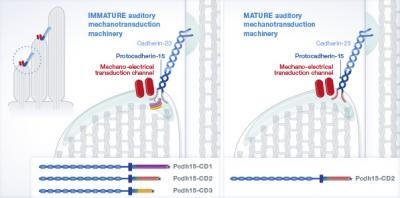HEIDELBERG, 17 June 2014 – A specific protein found in the bridge-like structures that make up part of the auditory machinery of the inner ear is essential for hearing. The absence of this protein or impairment of the gene that codes for this protein leads to profound deafness in mice and humans, respectively, reports a team of researchers in the journal EMBO Molecular Medicine.
"The goal of our study was to identify which isoform of protocadherin-15 forms the tip-links, the essential connections of the auditory mechanotransduction machinery within mature hair cells that are needed to convert sound into electrical signals," remarks Christine Petit, the lead author of the study and Professor at the Institut Pasteur in Paris and at Collège de France.

Within the hair bundle, the sensory antenna of auditory sensory cells, the tip-link is a bridge-like structure that when stretched can activate the ion channel responsible for generating electrical signals from sound. Photo courtesy of EMBO.
Three types of protocadherin-15 are known to exist in auditory sensory cells of the inner ear but it was not clear which of these protein isoforms was essential for hearing. "Our work pinpoints the CD2 isoform of protocadherin-15 as an essential component of the tip-link and reveals that the absence of protocadherin-15 CD2 in mouse hair cells results in profound deafness."
Within the hair bundle, the sensory antenna of auditory sensory cells, the tip-link is a bridge-like structure that when stretched can activate the ion channel responsible for generating electrical signals from sound. Tension in the tip-link created by sound stimulation opens this channel of unknown molecular composition thus generating electrical signals and, ultimately, the perception of sound.
The researchers engineered mice that lack only the CD2 isoform of protocadherin-15 exclusively during adulthood. While the absence of this isoform led to profound deafness, the lack of the other protocadherin-15 isoforms in mice did not affect their hearing.
Patients who carry a mutation in the gene encoding protocadherin15 are affected by a rare devastating disorder, Usher syndrome, which is characterized by profound deafness, balance problems and gradual visual loss due to retinitis pigmentosa. In a separate approach, the scientists also sequenced the genes of 60 patients who had profound deafness without balance and visual impairment. Three of these patients were shown to have mutations specifically affecting protocadherin-15 CD2. "The demonstration of a requirement for protocadherin-15 CD2 for hearing not only in mice but also in humans constitutes a major step in the objective of deciphering the components of the auditory mechanotransduction machinery. This isoform can be used as a starting point to identify the other components of the auditory machinery. By focusing our attention on the CD2 isoform of protocadherin-15, we can now consider developing gene therapy strategies for deafness caused by defects in this gene," says EMBO Member Christine Petit.
The CD2 isoform of protocadherin-15 is an essential component of the tip-link complex in mature auditory hair cells
Elise Pepermans, Vincent Michel, Richard Goodyear, Crystel Bonnet, Samia Abdi, Typhaine Dupont, Souad Gherbi, Muriel Holder, Mohamed Makrelouf, Jean-Pierre Hardelin, Sandrine Marlin, Akila Zenati, Guy Richardson, Paul Avan, Amel Bahloul and Christine Petit
Read the paper at https://embomolmed.embopress.org/content/early/2014/06/16/emmm.201403976
About EMBO
EMBO is an organization of more than 1600 leading researchers that promotes excellence in the life sciences. The major goals of the organization are to sup-port talented researchers at all stages of their careers, stimulate the exchange of scientific information, and help build a European research environment where scientists can achieve their best work.
EMBO helps young scientists to advance their research, promote their interna-tional reputations and ensure their mobility. Courses, workshops, conferences and scientific journals disseminate the latest research and offer training in tech-niques to maintain high standards of excellence in research practice. EMBO helps to shape science and research policy by seeking input and feedback from our community and by following closely the trends in science in Europe.
For more information: https://www.embo.org
Source: https://www.eurekalert.org/pub_releases/2014-06/embo-hpr061714.php

